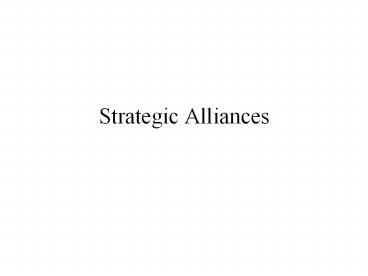Strategic Alliances - PowerPoint PPT Presentation
Title:
Strategic Alliances
Description:
Sources of Interfirm Synergies that can Motivate Strategic Alliances ... Imitability. Direct Duplication. Difficulty in developing socially complex skills. Substitutes ... – PowerPoint PPT presentation
Number of Views:32
Avg rating:3.0/5.0
Title: Strategic Alliances
1
Strategic Alliances
2
Motivation for Strategic Alliances
- Technology Exchange
- Global Competition
- Industry Convergence
- Economies of Scale and Reduction of Risk
3
Reasons for Strategic Alliances
- Gain access to new markets
- Enter new businesses
- Introduce new products
- Overcome trade barriers
- Avoid predatory competition
- Gain access to complementary resources
- Pool resources, skills, and risk capital
- Share risk
- Share R D expenses
4
Sources of Interfirm Synergies that can Motivate
Strategic Alliances
- Exploiting economies of scale
- Learning from competitors
- Managing risk and sharing costs
- Facilitating tacit collusion
- Low-cost entry into new markets
- Low-cost entry into new industries and new
industry segments - Managing uncertainty
5
Entry Mode
Advantages
Disadvantages
Ability to realize location and experience-curve
economies
High transport costs Trade barriers Problems with
local marketing agents
Exporting
Low development costs and risks
Licensing
Lack of control over technology Inability to
realize location and experience curve economies
Inability to engage in global strategic
coordination
6
Entry Mode
Advantages
Disadvantages
Lack of control over quality Inability to engage
in global strategic coordination
Franchising
Low development costs and risks
Lack of control over technology Inability to
engage in global strategic coordination Inability
to realize location and experience economies
Joint Ventures
Access to local partners knowledge Sharing
development costs and risks Political
acceptability
7
Entry Mode
Advantages
Disadvantages
Protection of technology Ability to engage in
global strategic coordination Ability to realize
location and experience economies
Wholly owned subsidiaries
High costs and risks
8
Motivation for International Strategic Alliance
Formation
To Take Existing Products to Foreign Markets
To Diversify Into a New Business
New Markets
Learning from your partner Learning with your
partner
Open Markets Closed Markets
To Strengthen The Existing Business
To Bring Foreign Products To Local Markets
Achieving economies of scale Acquiring
technology Reducing financial risk of major core
business projects
Marketing distribution Screwdriver assembly
plants Developing local technology Technology
flowback to foreign parent
Existing Markets
New Products
Existing Products
9
PALs Across Companies
- Pooling
- Allying
- Linking
10
Examples of Types of Strategic Alliances
- Service Alliances
- Opportunistic Alliances (Product-link)
- Stakeholder Alliances
11
Contractual Forms
- NONEQUITY ALLIANCE managed through contracts
- EQUITY ALLIANCE Cooperative contracts equity
investments - JOINT VENTURE Independent firm formed by
cooperating firms
12
Threats as Opportunistic Behavior
- Adverse Selection
- Moral Hazard
- Holdup
13
Integration Issues Social Complexity
- BARRIERS TO INTEGRATION
- Different functional time orientation
- Different functional language and interpersonal
orientation - Different goal orientation
- Formality of structure
- FACILITATORS OF INTEGRATION
- Shared values
- New product vision provided by leadership
- Budget allocation to foster integrated design
14
Strategic Alliances and Sustained Competitive
Advantage
- Rareness
- Number of firms and other alliances in the
industry(s) - Benefits obtained, especially complementary
assets and abilities
15
Strategic Alliances and Sustained Competitive
Advantage
- Imitability
- Direct Duplication
- Difficulty in developing socially complex skills
- Substitutes
- Internal Development/Corporate Entrepreneurship
- Venture Capitalists
- New-Venture Incubator
- Idea Generation and Transfer Program
- Intrapreneurship
16
Strategic Alliances and Sustained Competitive
Advantage
- Acquisitions
- Speed versus Cost of Acquisition
- Access to Complementary Assets versus Unnecessary
Adjunct Businesses - Removal of Potential Competitor versus
Organizational Clashes - Upgrade Corporate Resources versus Major
Commitment
17
Reasons for Acquisitions
- Increased market power
- Overcome entry barriers
- Increased speed
- Lower risk compared to developing new products
- Increased diversification
- Avoid competition
18
Strategic Fits Between a Target and a Bidder
Business
Adding New Products
Related-Complementary New Products Similar
Customers
Unrelated New Products New Customers
Identical Similar Products Similar Customers
Related-Supplementary Similar Products New
Customers
Serving New Customers
19
Reasons For Acquisitions Poor Performance
- Overdiversification
- Managerial energy absorption
- Excess debt
- Too large
- Acquisition as a substitute for innovation
- May Lead to Need for Restructuring
20
Strategic Alliance Checklist
- 1. Understanding your capabilities and needs
- Do you really need a partner? For how long?
- How big is the payoff? How likely is success?
- Is a joint venture the best option?
- 2. Choosing an appropriate partner
- Does the partner share your objectives for the
venture? - Does the partner have the necessary skills and
resources? - Will you have access to them?
- Will you be compatible?
- Can you arrange an engagement period?
21
Strategic Alliance Checklist
- 3. Designing the joint venture
- Define the ventures scope of activity, and its
strategic freedom via its parents - Lay out each parents duties and payoffs, to
create a win-win situation - Establish the managerial role of each partner
- 4. Doing the deal
- How much paperwork is enough? Trust versus legal
considerations - Agree on an end game
22
Strategic Alliance Checklist
- Making the venture work
- Give the venture continuing top management
attention - Manage cultural differences
- Watch out for inequities
- Be flexible































